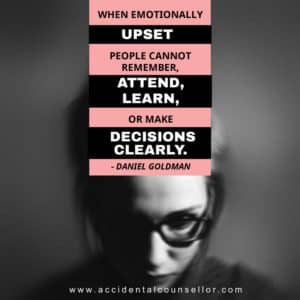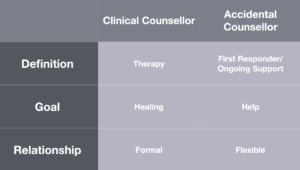Welcome to the online Accidental Counsellor Short Course, a brief 80 minute overview of the Accidental Counsellor Training that I created back in 2008. The goal of this short course is to help you connect and influence with the people that you support without burning out yourself through the Accidental Counsellor model.
In that model, we will look at strategies based in three key areas, wellbeing and self-care, connection, and influence.
– Wellbeing and self-care so we looking after ourselves in the work that we do.
– Connection, we talk about being able to connect to the person’s story of pain and upset.
– Influence the conversations you have with solution focused questions so you can ask appropriate questions to help the person identify their next best step. Also, we’ll look at a referral framework that will help you identify red flags so that you can refer the person that you’re working with to the right resource.

Rocky Biasi here I created the Accidental Counsellor Training back in 2008, based on my experience of almost two decades as a high school teacher and a school Counsellor also in private practice. And I’ve presented the Accidental Counsellor Training level one and level two, across Australia and New Zealand and Southeast Asia. And since that time, we’ve presented this training to over 10,000 people, not just to people who work in schools but in every sector. So that’s just a little bit about me and how the training came to be.
Let’s just start with the definition of an Accidental Counsellor. I think there are three key distinctions that I’d like to share with you that illustrate the differences between an Accidental Counsellor and a Clinical Counsellor.
First let’s start with a working definition? In my mind I think that someone who is a Clinical Counsellor, their main work is therapy. As an Accidental Counsellor, that’s not the case you’re more a first responder, but not always.
Sometimes you’re in a role where you’re providing ongoing support, maybe managing a team, or you may be the head of a group at a school. You could be in a role where you have ongoing relationships with people, you’re not just a first responder. What about the goal of the work? I think that a Clinical Counsellor, like I said before, it’s about therapy.
Why do people come to therapy? They come because they want to have some type of healing and as an Accidental Counsellor that’s not really the case. We’re there to provide help and support. Interestingly at a recent training, I had someone say to me, “Rocky, but can’t there be healing, even when we’re in the role of Accidental Counsellor.”
Absolutely, yes that can happen. I think that that’s what happens when we can listen deeply to the person’s pain and suffering. But that’s not the primary thing, that’s not why people typically come to you as an Accidental Counsellor they don’t usually come for “healing”. Also, it’s not really what your intention is when you’re responding to the person, it’s more a by product of listening well. The third and last distinction is probably the biggest one and that is the nature of the relationship.
As a Clinical Counsellor the nature of the relationship is much more formal and structured.
As an Accidental Counsellor that’s radically different, isn’t it? As an Accidental Counsellor, the nature of the relationship is much more flexible. It’s much more informal. These 3 distinctions and differences help clarify the different role we have as an Accidental Counsellor compared to a professional counsellor in private practice.


